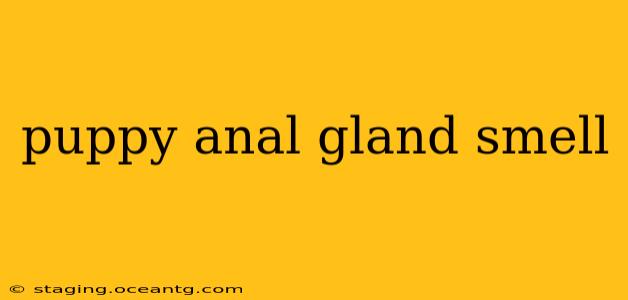The pungent odor emanating from a puppy's anal glands is a topic many pet owners would rather avoid. However, understanding the causes, prevention, and treatment of anal gland issues is crucial for maintaining your puppy's health and well-being. This comprehensive guide delves into the intricacies of puppy anal gland smell, providing you with the knowledge you need to address this sensitive subject.
What Causes the Smell?
The smell originates from the anal sacs, two small glands located on either side of the anus. These glands secrete a musky, foul-smelling fluid that normally gets expressed during bowel movements. However, various factors can disrupt this natural process, leading to impacted or infected anal glands. The most common causes include:
- Infrequent or incomplete bowel movements: Hard stools can fail to adequately stimulate the expression of the anal sacs. Constipation is a frequent culprit.
- Loose stools (diarrhea): Paradoxically, loose stools can also lead to anal gland problems. The fluid can't be efficiently expelled, allowing bacteria to build up.
- Obesity: Overweight puppies may have difficulty expressing their anal glands naturally.
- Low-fiber diet: A diet lacking sufficient fiber can contribute to constipation and subsequent anal gland problems.
- Breed predisposition: Some breeds, such as Cocker Spaniels and Poodles, are more prone to anal gland issues.
- Underlying medical conditions: Certain conditions can weaken the muscles surrounding the anal glands, hindering their ability to empty properly.
Why Does My Puppy's Anal Glands Smell So Bad?
This is a question many pet owners have. The intensely unpleasant odor arises from the composition of the anal sac fluid itself. This fluid contains a mixture of bacteria, proteins, and fatty acids, all contributing to its characteristic pungent aroma. When the glands are impacted or infected, the concentration of these components intensifies, resulting in a significantly stronger and more unpleasant smell. Moreover, the smell can worsen if the anal sacs become infected, leading to pus and additional bacteria.
How Do I Know if My Puppy Needs Veterinary Attention?
While a mild, occasional anal gland odor might be manageable, certain signs indicate a need for veterinary care:
- Strong, persistent odor: An unrelenting, overpowering smell is a clear indicator of a problem.
- Scooting: Your puppy may drag their bottom across the floor, trying to relieve the discomfort.
- Licking or biting the anal area: Excessive licking or biting suggests irritation or pain.
- Swelling or redness around the anus: These are symptoms of infection or inflammation.
- Visible discharge: Pus or other fluid leaking from the anal area requires immediate veterinary attention.
- Lethargy or loss of appetite: These could suggest a more systemic infection.
How Are Puppy Anal Glands Treated?
Treatment depends on the severity of the problem. A veterinarian will typically perform manual expression of the anal glands, a procedure that involves gently squeezing the sacs to empty their contents. However, if the glands are infected or severely impacted, they may require more extensive treatment, including antibiotics, anti-inflammatory medications, or even surgical removal in extreme cases.
How Can I Prevent Anal Gland Problems in My Puppy?
Prevention is always better than cure. Here are some key preventative measures:
- High-fiber diet: A diet rich in fiber helps promote regular, firm bowel movements. Consult your veterinarian for recommendations.
- Regular exercise: Encouraging regular exercise helps stimulate bowel movements.
- Maintain a healthy weight: Obesity puts extra stress on the anal glands.
- Regular veterinary checkups: Routine examinations allow your vet to detect and address any potential issues early on.
Can I Express My Puppy's Anal Glands Myself?
No. Manual expression of anal glands should only be performed by a veterinarian or experienced veterinary technician. Improper technique can cause injury or infection. Attempting it at home is strongly discouraged.
What if My Puppy Keeps Having Anal Gland Problems?
Recurring anal gland issues might indicate an underlying medical condition. Your veterinarian may recommend further investigations to identify and address any contributing factors. This could include blood tests, fecal analysis, or imaging studies. Addressing the underlying cause is crucial for long-term management.
This guide provides general information. Always consult your veterinarian for specific advice regarding your puppy's health. Early intervention is crucial in managing anal gland issues and ensuring your puppy's comfort and well-being. Remember, your veterinarian is your best resource for addressing any concerns about your puppy's health.
